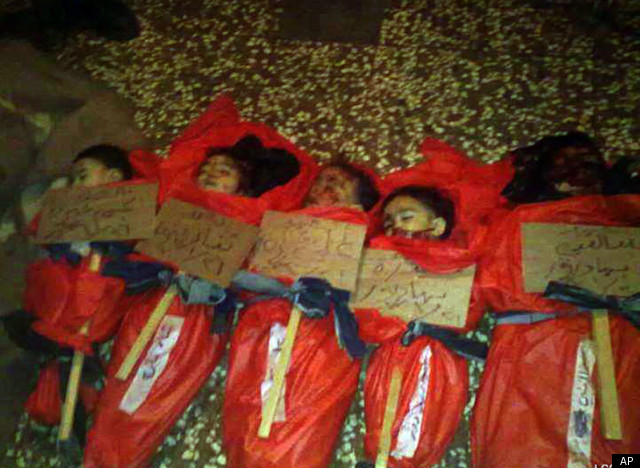As the Washington Post likes to point out, Syria is approximately the size of Washington state. But, other than our arid swaths of eastern desertscape, the geopolitical similarities seem to end there. Our population is a third of Syria’s and our civil war is called the Apple Cup. We have not killed 100,000 of our neighbors, uprooted millions from their homes, or gassed our children. Our governor typically does not download “Sexy and I Know It” from I-Tunes while having his citizens shot in the street and napalmed at school.
Yet it’s those bloody differences that have brought us together. Our boys are already in the air over Aleppo and in the waters of the Red Sea. The eye-in-the-sky ScanEagle drone built by Boeing in the Columbia Gorge is surely panning Syria’s terrain for chemical weapons units, while the Everett-based Navy carrier USS Nimitz stands off the Arabian Peninsula ready to launch F/A-18s bearing air-to-surface missiles, in preparation for a U.S. strike.
And our congressional delegation, which will help decide whether to launch, is currently more focused on Damascus than Olympia, even if what they say amounts to saying nothing. Rep. Adam Smith is “worried,” Sen. Patty Murray is “concerned” and Sen. Maria Cantwell has “serious questions” about President Obama’s plan for a sortie to destroy Bassar al-Assad’s chemical troops and equipment. Rep. Jim McDermott adds that we “proceed with caution.”
They want to study the issue further. But do they truly not yet know what Barack Obama plans to do in Syria? Hit, run, done. The Pentagon says the target would be Syria’s chemical military units and buildings, and any artillery or rockets used to deliver them (to avoid potential disasters, chemical storage facilities would be untouched).
It’s not war. It’s not Iraq. It’s not a game changer. But it is the U.S. enforcing international law banning chemical warfare. “I didn’t set a red line,” the president said yesterday. “The world set a red line.” Pictures of children spread out on morgue floors, appearing to be in peaceful sleep, set it too. The “most massive and terrifying use of chemical weapons this century” is how French Prime Minister Ayrault describes Assad’s murder of innocents.
The U.S. rightly stayed out of Syria’s complicated uncivil if not unholy war, though we have been slow to supply, as promised, fractious rebel forces seeking to end the House of Assad’s bloody reign, bolstered by money and weapons from Russia and Iran. But Obama, like many, was moved by the August 21 chemical massacre of 1,400, saw it as the opportunity to respond in a way not only to punish but to show Syria on which side of good and evil the U.S. stood.
Jon Stewart’s response was, “We have to bomb Syria because we are in seventh grade. And the red line – the red line that they crossed is actually a dick-measuring ribbon.” Actually, here’s what some fifth graders, at least, think, from the Facebook page of Assad’s 11-year-old son, Hafez: “I just want them to attack soooo much, because I want them to make this huge attack of beginning something that they don’t know the end of it.”
Historically, when weighing foreign intervention, measuring sticks – along with past sins and hypocrisies — regularly come into play: our unnecessary wars, tardiness to act, and blindness to distant slaughter. We are the world’s imperfect cop trying to decide when to use force and who to set free, a selection corrupted by money and politics. We’ve gotten it wrong too often.
Americans are left to decide – sifting through the claims and statements of officials and the news reports of the moment – the right path and if we’re being lied to. It comes down to whether you believe what this president is telling you this time. And while military decisions shouldn’t be based on the heart, it’s a factor.
Obama appears to have unpacked all that baggage. He anticipated being asked “why now?” Are 1,400 non-combatant deaths more important than 100,000 civilians and warrior deaths? The answer is: We should do what we can. The strike would not be open-ended, he said. The “American people have the good sense to know we cannot resolve the underlying conflict in Syria with our military. And that’s why we’re not contemplating putting our troops in the middle of someone else’s war.”
The man who officially ended the war in Iraq and is ending the war in Afghanistan insists there will be no U.S. war in Syria. But keeping the chemical attack in the headlines puts additional international pressure on Assad – who reportedly is busying moving his chemical supplies and troops around in anticipation, distracted by the American threats and thus perhaps killing a few less citizens. Obama can thus take his time.
Ultimately Assad has to pay something for the massacre, Obama has made clear, making a launch date inevitable. A quick strike is not unprecedented, and apparently would be more limited than the cruise missile launch by Bill Clinton on targets in Afghanistan and the Sudan as payback for the 1998 U.S. embassy bombings.
“What message will we send if a dictator can gas hundreds of children to death in plain sight and pay no price?” Obama asks. Syria’s government acknowledges the chemical attack took place, he notes (and the use of napalm has since been documented, as have cluster bombings). So far, Assad has no reason to desist. “If we really do want to turn away from taking appropriate action in the face of such an unspeakable outrage,” Obama says, “then we just acknowledge the costs of doing nothing.”








